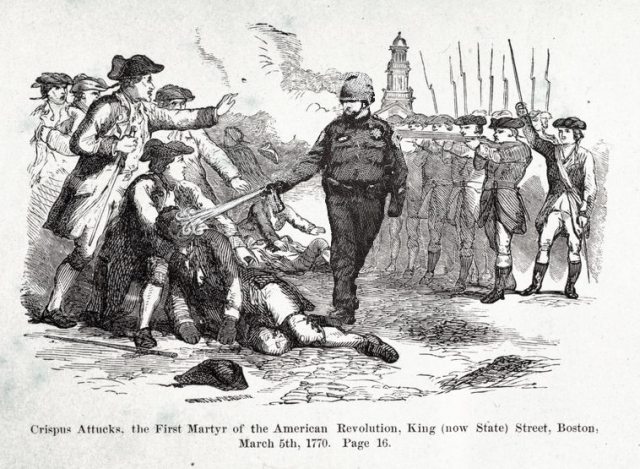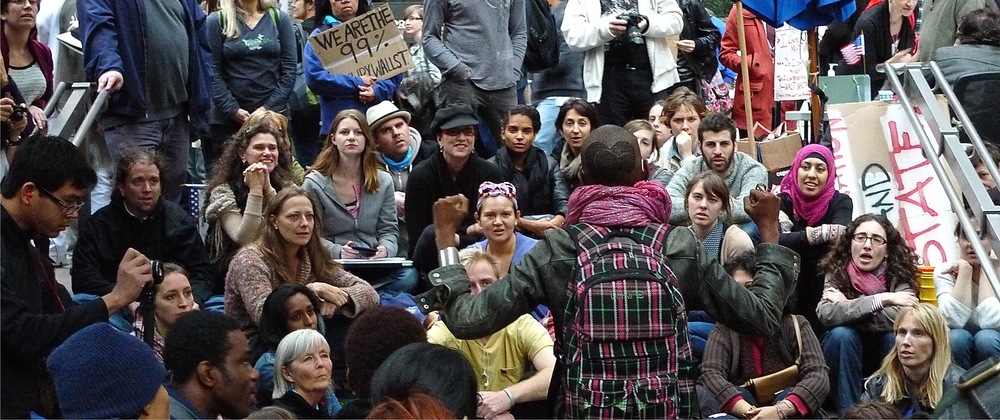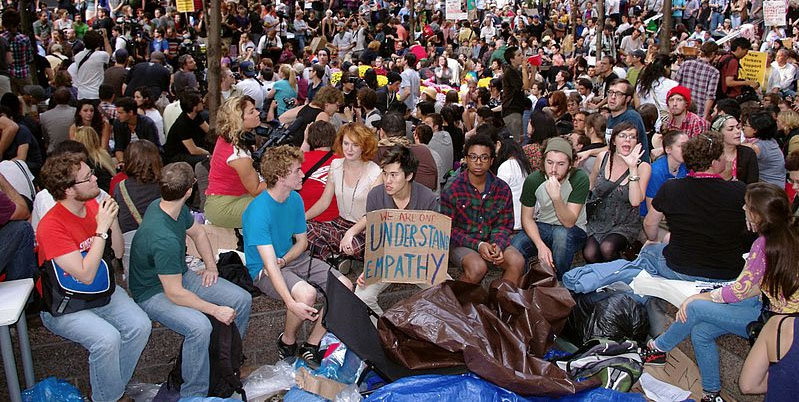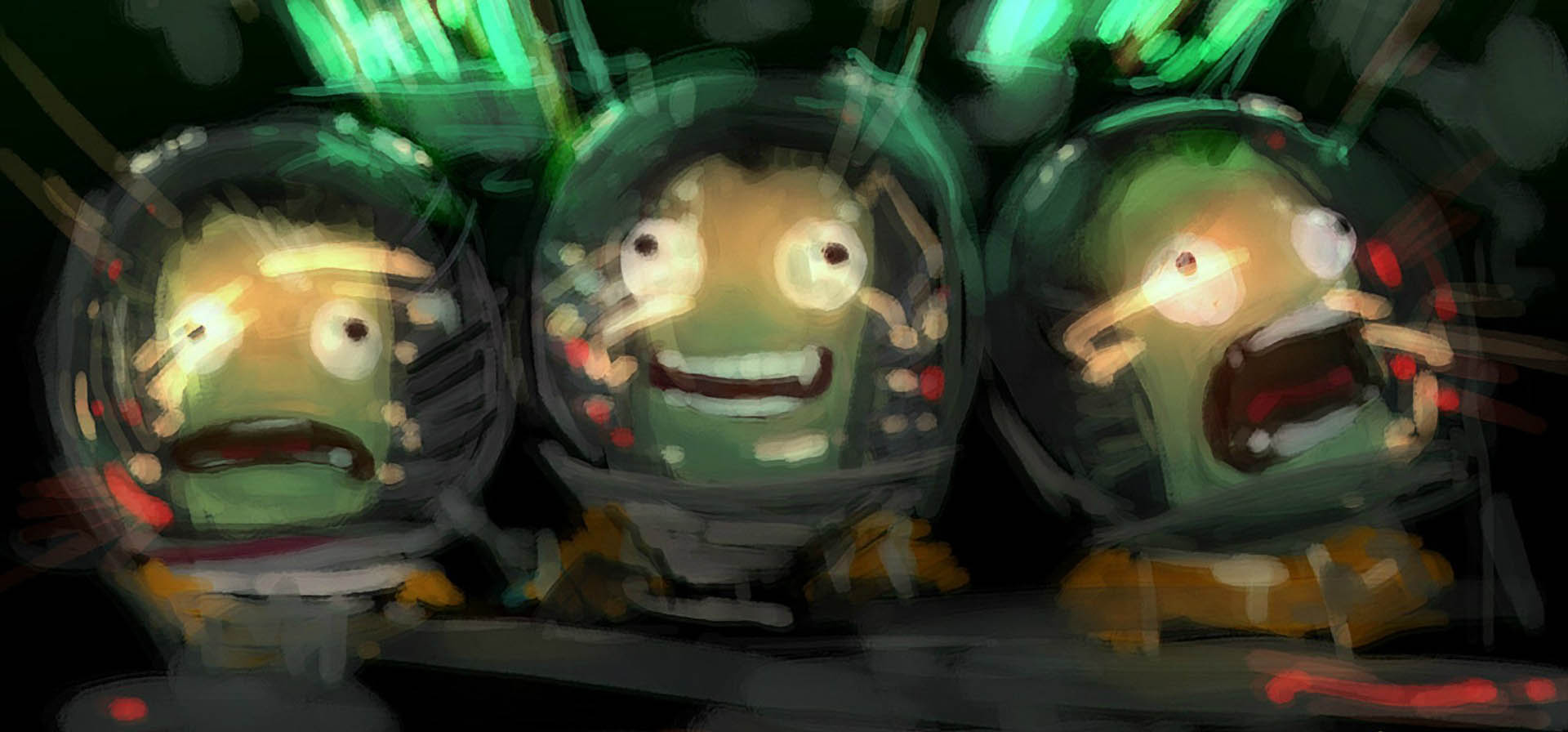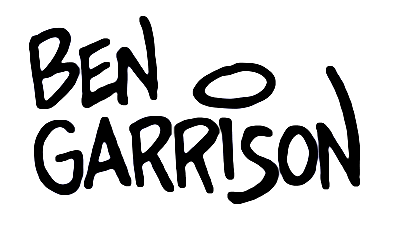
Occupy WWW Street (FI)
Internet Activism and Media in the Age of Social Justice
"I don't have access to any unusual methods of analysis and what special knowledge I have concerning language has no bearing on social and political issues. […] For the analysis of ideology […] a bit of open-mindedness, normal intelligence, and healthy skepticism will generally suffice." – NC
I'm bringing out my serious font again. It's difficult to talk about current affairs without inviting in heaps of context, so I'd like to delve into some recent history.
Reminder, shooting the messenger is poor form, and heresy is medieval.
(🇫🇮 Links have been unarchived)
The Only Working Class Man In The Village
It's September 2011, the American left has been galvanized. The message is straightforward and aimed at big targets: the 99% of the public is telling the 1% scrooges to stop being greedy and not use corporations as a club. Zuccotti Park in New York fills with activists camping out, discussing and spreading their message.
Cue Jesse LaGreca. With his quintessential American Joe Average look, he takes most folks by surprise, most certainly the Fox News reporter who approaches him. In the impromptu interview, unaired by Fox, LaGreca schools the man and powers through, knocking it out of the park. He calls out the leading questions right away, and notes that if there's one thing the news—"the propaganda machine in the media"—doesn't wish to report on, it's itself. That maybe it's time to have some participatory democracy that "isn't funded by news cameras."
A reporter shows up expecting to report on the world and discovers this story is, at least in part, about themselves. The denial is quick: "We’re here giving you an opportunity on the record […] to put any message you want out there, to give you fair coverage […] So, there is an exception in the case, because you wouldn’t be able to get your message out there without us."
He snaps back: "Certainly. Take for instance when Glenn Beck […] called the president a person who hates white people and white culture. That was a low moment in Americans' history and you guys kind of had a big part in it. So I'm glad you're coming around and kind of paying attention to the [rest of the country] as opposed to the far right fringe who would just prefer to destroy the middle class entirely. […] People would like to see a little bit more economic justice, or social justice, you know, Jesus stuff, as far as feeding the poor, healthcare for the sick. […] I find it really entertaining that people like to hold the bill of rights up while they're screaming at gay soldiers, but they can't wrap their heads around the fact that a for-profit health care system doesn't work. […] If we want the president to do more, let's talk to him on a level that works instead of asking for his birth certificate, […]"
Shots fired, critical hit, no chance of recovery. It's no surprise it was left on the cutting room floor, and no surprise it would leak and shoot to fame as being too extreme for Fox news. Predictable headlines asked if he was the The Smartest Man on Wall Street and explained that Jesse LaGreca Continues to Destroy Media Bias of Occupy Wall Street. All reporters eagerly falling over themselves to demonstrate how they were willing to give anyone a voice.
This was an angle LaGreca himself brought up on air: "The reality is that I’m the only working class person you’re going to see on Sunday news… political news… maybe ever. And I think that is very indicative of the failures of our media to report on the news that matter most importantly…" The host immediately cuts in, "We are trying our best, Jesse."
However when asked if there was a political demand that could sum up Occupy, something to "make this about," he takes a curious turn:
"I think the entire movement is about economic justice. I mean to me – and I’m not speaking on behalf of Occupy Wall Street, I’m just giving my personal opinion – I think it’s a matter of economic rights, and I think it’s a matter of social rights, and social justice. And to the people who would take offense to the word “social” being placed before the word “justice,” I’d invite them to re-read the Constitution."
Ok. I went through the trouble and enacted the labor to educate myself. The United States Constitution makes no references to anything social with regards to justice. Those who wrote it seemed to think that merely "establishing Justice" was plenty enough. It does not rank citizens by privilege, does not define powers in relation to oppression and makes no allusions to punching up. That's what social justice is nowadays, right? Or did he mean the "Jesus stuff"? I'm no constitutional lawyer, feel free to correct me.
More awkwardly, on the subject of taking their cues from other protests, in Greece and Europe and elsewhere, LaGreca claimed "we didn’t take our cue leading off of anybody really."
Occupy may have grown organically from existing groups, but it was jumpstarted by an early blog post and a message blast to Adbusters' subscriber base of "you 90,000 redeemers, rebels and radicals out there," declaring a "worldwide shift in revolutionary tactics is underway," asking if they were ready to have their own "Tahrir moment." The 267 comments show this message was received with enthusiasm and commitment.
LaGreca also wasn't a nobody, he'd been a Daily Kos contributor for three years already. The site's community cheered him on for "not [fitting] into the media’s stereotype of the obtusely disenfranchised ne0-hippies" and helped get the word out while commenting on the spectacle: "My guess is that Hannity is scared. As he should be!"
This is not an indictment of Mr. LaGreca, he mainly talked a lot of sense and said it well. However, four years have passed. Despite the generous airtime afforded by his newfound fame-by-Streisand and the stated desire from reporters to do better, the situation did not improve, not with Fox News and not with the other outlets who define themselves through opposition.
If there's one thing the media loves, it's the exception that confirms the rule: you cannot galvanize the public without access to existing networks and platforms. When you go up against the media, they will repackage you into an entertainment product, and the masses will love it. You might love it too.
Activists Are Dead
So what happened? In June 2012, community hub and non-profit OccupyWallSt.org posts that Reports of Occupy’s Death Have Been Greatly Exaggerated.
"Since the eviction of the protestors at Freedom Plaza last November, it’s become a media cliché to report on the “Death of Occupy.” Articles pop up all over the web, blithely reporting on the failed second wind of Occupy, this lackluster “American Spring,” and the May Day general strike that didn’t quite shut the system down.
It should be no surprise that the mainstream media is eager to report on Occupy’s supposed demise. Even ignoring the fact that the corporate-owned media has a strong desire to never see social movements such as Occupy succeed, the media, as a rule, generally needs to put a dramatic narrative to everything it reports. To them, every story ought to have a captivating story arch with a beginning, middle, and an end."
"In the media’s eyes […] many people heeded the call, [yet] the movement only received its dramatic momentum when cops were photographed attacking and pepper-spraying the nonviolent protestors. It reached its early demise when the police violently cleared out the various encampments. Now, except for a few curmudgeons who can’t seem to understand that Occupy is over, all that remains of Occupy is its populist rhetoric of the 99%—which has been dutifully hawked up by Democratic front-groups such as MoveOn.org to help refuel the Obama election machine."
So much for that then. What's on TV tonight? A presidential debate?
"This popular narrative […] has been so successful that even those who are still active within the Occupy movement can’t help but absorb parts of it. […Meetings] sometimes border on something closely resembling a public support group. On the internet, vaguely self-congratulatory Paul Krugman-y articles, applauding Occupy for “at least shifting the public dialogue,” are posted and reposted […] to remind each other that Occupy at least had a little bit of an effect."
Whelp, that sounds like fun. The post continues to explain at length how Americans see history as "something other people (usually white, upper class men) did long ago" and forget it "took hundreds of thousands of people—especially young people, women, and working class men–to support and spread the ideas of democracy. […] [We] see Occupy as a spectacle […] by people very unlike ourselves. […] Occupy-friendly celebrities and artists, black block style anarchists, and our cities’ despotic mayors are the characters in this drama, [battling it out] for headlines on the stage of our trash-strewn cities."
"The true magic of Occupy was that it rejected all of these things. No one had any more power than anyone else, […] nobody in Occupy really cared that we were ignored by the mainstream media. We don’t need a bunch of hacks at Time Magazine to commend us for our ability to protest. […] The goal of Occupy was to get together as a community of equals, to claim a future different than the ones they gave us, and to reignite a tradition of democratic progress […] It was a way of exploring new ways of interacting with others."
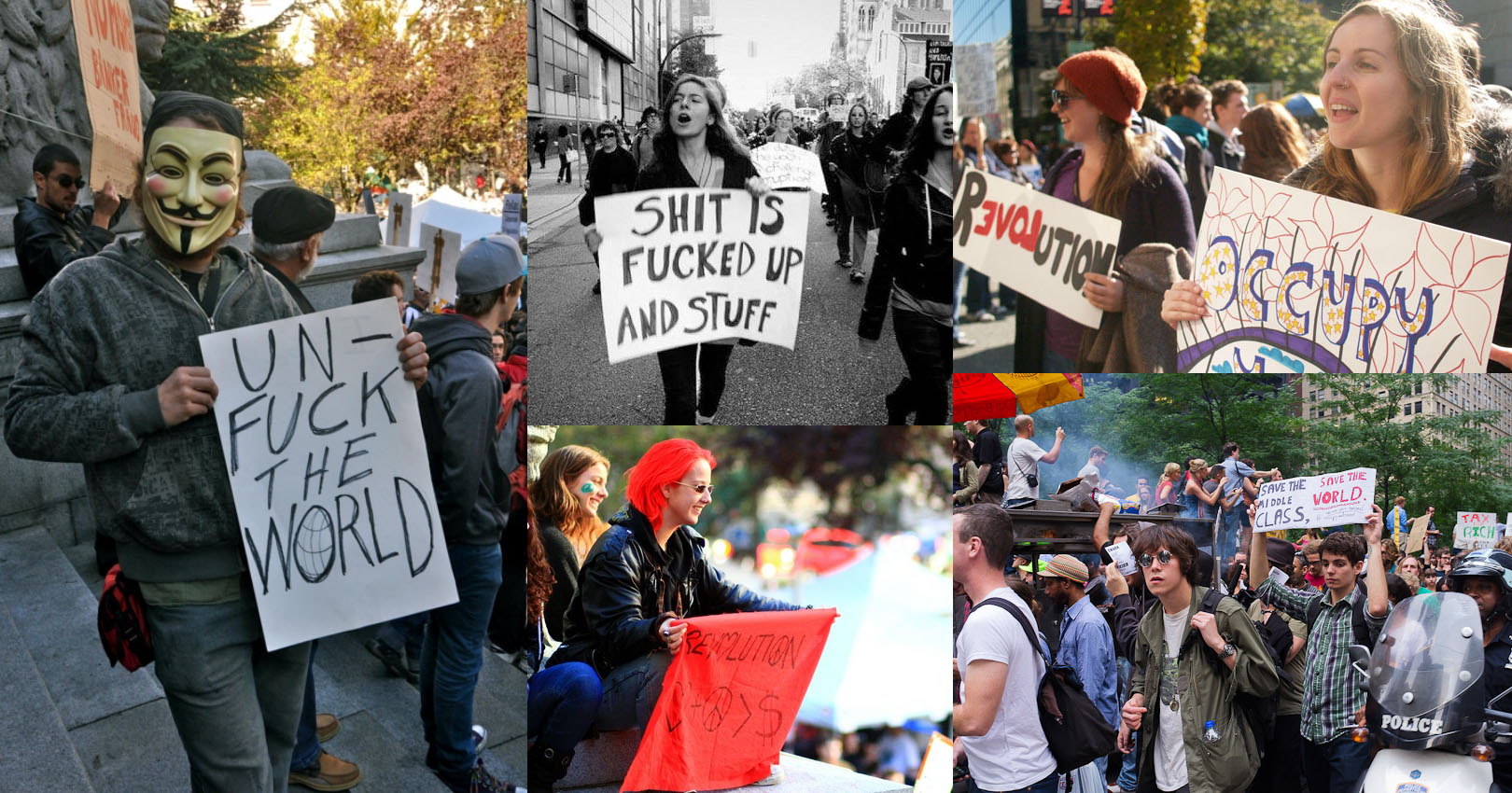
The author insists we should not "[shrug] off Occupy as a momentary fad or a leftist pipedream." Ok. Aside from a "feeling in the air", the listed effects are that "over 7,200 Occupy protestors have been arrested in the United States" with many "beaten and tortured." Occupy has been demonized because "the media has been strong-armed into reporting […] in an unfavorable light." What else?
"It needs to be remembered that the word “occupy” is […] a call to action, not the action itself. [It] was useful for getting individuals and organizations previously isolated or focused on one-issue grievances out into the streets. […] What is important is that there’s wide community of opposition being formed across many social barriers, and those who hold power are very afraid."
Ignore the posturing at the end, notice something far more telling.
The stated result of Occupy, in a post meant to prove its lasting value, is that 7,200 people made victims and martyrs out of themselves, sustained by passive idealistic resistance from abroad. They have slid into depressed irrelevance, misrepresented by those who should report in the public interest. They were ok with this.
The best lies are half truths. This collective totally-not-mourning ritual was a kernel of rock-hard reality wrapped in narcissistic self-delusion. One might even call it Stockholm Syndrome. These are the evolved Pokémon variants of victim culture, where victimhood is celebrated, because it can offer immense power.
Burgers and Fries with Ketchup
I especially don't buy into the official Occupy story, either the media's or the movement's, because I went and saw for myself in Vancouver. I'm not talking about the 9/11 Truthers or 420 weed signs: they come with the territory, where else would they go? No, I noticed two groups in particular.
First, the starry eyed latté kids manning the human microphone as they called it—just like in Biscotti Park!—with matching friends too fashionably kept to be poor. It struck me as sinister: because of the Occupy-wide suppression practice of banning audio equipment, they were reduced to slowly repeating each other, chanting mantras. This was further sabotaged by a general lack of focus or moderation. Throw in a mix of people who have more feelings than they know what to do with, and it goes nowhere veeeery slowly, like Twitter in bullet time.
This sight was no public forum for enlightened debate, no town hall gathering, it was an obnoxious soapbox no ordinary person would listen to for more than 5 minutes. They had heard of activism, even knew what it looked and sounded like, but they merely went through the motions. Same on many livestreams I tuned into elsewhere.
Second, the actual homeless of the city: unemployed and unemployable, mentally ill, chronically addicted or otherwise rejected by society, mulling around the space they already occupy every day. Put both groups together, quelle surprise, high minded principles about equality, privilege, diversity, ableism, free expression and shared ownership are tested. Youth whose idea of camping is a summer festival with sanitized portapotties and water stations found a public square in winter less accommodating. Furthermore, when the inevitable conflict and crime occurs, those who reach for the words "triggered" and "rape culture" like candy are probably not the best arbiters of actual justice.
Instead of facing reality, they adopted the progressive stack, which "encourages women and traditionally marginalized groups [to] speak before men, especially white men." If you dig into the grapevine, you will find grumblings of "meetings derailed by women and minorities obsessed with identity politics. […] [Plans] were almost always met with objection from feminists, queer activists, blacks, latinos, et al. A lot of the time these people didn't even have specific points of concern. […] They just stood up and started complaining about lack of diversity, the victimization of their specific identity group, etc. […] Smart, able, organized white guys left the protest. They threw up their hands and walked away."
You can find many stories of in-fighting and abuse, it provided ample fodder for the media, social or otherwise. What did or did not occur at specific events was rarely considered relevant, and such concerns became more important than the financial and economic system or the institutions that sustain it. We apparently had to confront the gender-based violence in the Occupy movement: "Exactly what occurred is unclear. Some claim there was an attempted rape. Others shrug off the incident as nothing more than an invasion of a young woman’s personal space by an intoxicated man." Do you suppose that distinction might be important?
Socially-just media pushed the hyperbole, reminding men "don't rape anyone, ever"—thx xojane—and that "women-only spaces are built to expedite advanced conversations about issues that affect women (and, ideally, anyone who does not identify as a man) without these discussions being constantly interrupted by the need to educate other folks in the gathering."
So in other words… Men, stay out, shut up. Women, don't ask any questions. Great job social justice, you brought everything you claim to abhor into your idealistic little utopia, chasing off everyone else.
It's easy to point at the whacky fringe characters with funny hair and glasses as the culprits. If you're Stephen Colbert, you can even mercilessly mock them in front of millions and score lots of points. The real problem is the activist mass itself and the media they buy into. They're too eager to derail themselves over issues they themselves admit are just a microcosm of a human community. The mistake is in assigning universal importance to isolated incidents while ignoring the elephants in the room. That's a disease concentrated in the media, but not only there.
It's difficult to take someone's Important Conversation about Deconstructing Issues seriously, when social justice doesn't know how to socialize.
/Chomsky/ was Right
In Language and Responsibility (1979), Noam Chomsky instead converses eloquently. He mainly explains his theories of linguistics, too niche for most. However, the book's opening chapter "Politics" starts off quite differently, with ideas that would later return in Manufacturing Consent: The Political Economy of the Mass Media (1988). Asked how his methods relate to his more well known political writings:
"I don't have access to any unusual methods of analysis and what special knowledge I have concerning language has no bearing on social and political issues. […] For the analysis of ideology […] a bit of open-mindedness, normal intelligence, and healthy skepticism will generally suffice."
"Take [the] intelligentsia in a society like ours. This social class, which includes historians and other scholars, journalists, political commentators and so on, undertakes to analyze and present some picture of social reality. […] They serve as mediators between the social facts and the mass of the population: they create the ideological justification for social practice. Look at the work of the specialists in contemporary affairs and compare their interpretation with the events, compare what they say with the world of fact. You will often find great and fairly systematic divergences […]."
"With a little industry and application, anyone who is willing to extricate himself from the system […] will readily see through the modes of distortion […] Everybody is capable of doing that. […] Often carried out poorly, […] social and political analysis is produced to defend special interests rather than to account for actual events." (p3-4)
He goes on to talk about the particular situation in the United States. He compares recorded facts with the accepted explanations of events such as the McCarthyist scare, the student revolution, the civil rights movement, the Vietnam war, and more. He covers US interventions at home and abroad, legitimate or illegitimate. The overriding theme is rather obvious:
"Here in the United States there is an astonishing degree of ideological uniformity for such a complex country. Basically, there are two reasons for this. First, there is the remarkable ideological homogeneity of the American intelligentsia in general, who rarely depart from one of the variants of state capitalistic ideology (liberal or conservative), a fact which itself calls for explanation. The second is that the mass media are capitalist institutions. […] The fact that these institutions reflect the ideology of dominant economic interests is hardly surprising." (p9)
An editorial in the New York Times from 1975, a retrospective on the Vietnam War, explains there are those who think "the war […] could have been waged differently" and those who think "a viable non-Communist South Vietnam was always a myth." Chomksy goes all in:
"They don't even mention the logical possibility of a third position: namely, that the United States did not have […] the legal or moral right, to intervene by force in the internal affairs of Vietnam. […] Note that as the Times sets the spectrum of ideological debate, the position of much of the peace movement is simply excluded from consideration. Not that it is wrong, but rather unthinkable, inexpressible. […]
Here we have a marvellous illustration of the functioning of propaganda in a democracy. A totalitarian state simply enunciates official doctrine—clearly, explicitly. […] one can only express opposition at one's peril. In a democratic system of propaganda no one is punished (in theory) for objecting to official dogma. In fact, dissidence is encouraged.
What this system attempts to do is to fix the limits of possible thought: supporters of official doctrine at one end, and the critics—vigorous, courageous, and much admired for their independence of judgement—at the other. The hawks and the doves. But we discover they all share certain tacit assumptions, and that it is these assumptions that are really crucial.
No doubt a propaganda system is more effective when its doctrines are insinuated rather than asserted, […] The more vigorous the debate, the more effectively the basic doctrines of the propaganda system, tacitly assumed on all sides, are instilled. Hence the elaborate pretense that the press is a critical dissenting force—maybe even too critical for the health of democracy—when in fact it is almost entirely subservient to the basic principles of the ideological system." (p36-39)
This was the 70s. What might that look like in the internet age?
Don't Stalk Me Bro
In 2006, Gawker Media launched the Gawker Stalker Maps, a site where visitors were encouraged to share live updates of celebrity sightings in public. Hollywood stars found the usual gaggle of papparazzi joined by even weirder people from the internet, and were not amused.
When called to defend the practice a year later by Jimmy Kimmel, editor Emily Gould goes for the gold in mental gymnastics. Despite the original request for sightings "as quickly as you can send them in," she claims the map is generally slow to update. She laughs away evidence of publishing lies as being "citizen journalism" which "everybody knows […] isn't checked," despite much of the content being editorial. She trips and fails to catch herself, calling it "a stalking…heh…it's not actual stalking", because there is no expectation of not being noticed in public, and it's just acknowledging celebrities as real people. She then immediately asks if celebrities aren't "protected by piles of money from any rocks thrown at them," gets called out and backpedals that "it's not okay to say false things about anyone," invalidating everything she said before.
Kimmel throws a rather fun anachronistic zinger too: "I don't know why anyone would buy advertising on a web site."
It's a rare occasion. Distant celebrities are humanized, old media takes new media to task, and the cheerful talking head is revealed for the blatant opportunist that she is. A chance to show the media does know better, right? Aaron Sorkin saw it too and featured this teachable moment in an episode of HBO's The Newsroom, lifting lines of dialog verbatim:
Except of course, all the sharp edges have been filed off. Instead of a bubbly editor of an internet gossip rag, there's a pudgy Zuckerberg-type pushing his tech startup and app. His protestations seem more genuine, and he's taken aback by the sudden accusations, rather than invited to explicitly address them. The celebrities are not represented, they are off-screen, being stalked and murdered. He's an oblivious technocrat harming society with his self-serving autism, she's the approachable-yet-merciless reporter bringing him to task.
You see how a story that was entirely about the media was turned into something completely different, without even changing most of the words? It's all in the delivery and presentation. The excuse that it can't be entirely realistic or literal does not apply. I find the whole thing rather convenient in pushing certain narratives. It confuses the sociopaths who run certain businesses with the people who maintain the tech, and clear-coats it with some subtle nerd bashing.
It could be a pretty good example of what Chomsky was talking about: when presenting an interpretation of fact, American gatekeepers apply a lens that shines only on a very narrow and predictable window, while insisting otherwise. Like showing you how news is actually made, an elaborate pretense that the press is a critical dissenting force.
Or it could just be a mediocre episode of a faltering TV show. But then I'm sure there are countless opinion pieces and comments already that debate this in excruciating detail.
Either way, in trying to bring reality into their fantasy, they have remade it in their own image. They tend to do that a lot. Not just the ones who write fiction.
Celebrate Diversity
Where might we have seen all of this again recently? Let me lay it all out. What do you do when you're a notable reporter in entertainment, like say, video games, who finds that trade press is mostly obsolete in an age of YouTube, Twitch, Twitter, Reddit and more?
Well, you might have an existential crisis when you realize you were just being a drunk megaphone for corporate marketing interests, and become a mouthpiece for your own interests instead. Get on Twitter and post "Fuck ethics get money," give talks in which you "have no pretense of being unbiased." Feature people and projects you like, promote political and social causes you think are important, and start picking the exclusives yourself instead of waiting for them to drop in your lap. All the while partaking in the global race to the bottom that is modern clickbait.
If enough people in a clique do this, it would create the appearance of an indie renaissance. However it would only feed attention to a very narrow scope of ideas, accessible only to those with specific connections who say the right things. If done in the context of a multi-billion dollar industry, this might create some resentment. Especially if there was years of dubious reporting, conflicts of interest and agenda pushing leading into it, with several careers permanently tarred and feathered through irresponsible rumour and lies. Hypothetically speaking, of course.
In such an environment, imagine evidence pops up that one of the media clique's new darlings is actually a rather disturbing individual. While profiling herself as a paragon of virtue and a talented progressive activist and game developer, she manipulates and lies her way through her career and relationships. This comes in the form of a warning and a detailed description of emotional abuse, proven with, say, lengthy Facebook citations. The details are quite lurid and salacious, namely infidelity with a set of eponymous Five Guys in the industry, including her boss and a Kotaku reporter. On top of that, she is seen to wear the Emperor's New Clothes, in that her "work" mainly consists of a single choose-your-own-adventure Twine book that would barely pass as a first year student's midterm project. It was praised mainly for its subject—depression—rather than its execution.
Imagine that in response to this, other acquaintances come out of the woodwork to describe other things she possibly did. Like framing a forum of depressed people as harassers for attention, leaking personal data on a rival charity, getting friends in media to blacklist them, sabotaging a reality TV game event she was in, raising money for another event that never happened, and generally being resented by past contacts.
More importantly, imagine that this scandal leads to other conflicts of interest being revisited or discovered, previous media lynchings to be brought up and accountability to be demanded, because it involves multiple influential outlets and a lot of people are tired of it.
Rather than admit it's all become a big joke and everyone's been played, reporters might choose to close ranks instead. They might concoct a tale that all the criticism she receives is harassment, that gamers are obtuse shitslingers and wailing hyperconsumers who hate women, declaring the gamer identity to be dead in ten articles published in 24 hours. Though it would alienate their core readership, it would please the newer, more political segment, who would see all their existing biases about video games and gamers confirmed, being ignorant of the medium's established history of complicated themes being explored maturely.
New readers might see it as a license to step in, educate the plebs and defend the fair maidens from the supposed savage horde, in full sight of friends on social media, nodding respectfully. They might rephrase events as a "jilted ex"—even though he dumped her—who has been rallying a hate mob on the evil depths of 4chan—even though he posted on Something Awful and Penny Arcade first and reaction was mixed. They might speak of him leaking "revenge porn" when in actuality it's her own paid erotica circulating. All of these are either outright lies or an admission of not having bothered to read source material.
It would be vital for reporters to never mention the coordinated censorship that might start to take place on Reddit, 4chan and other gaming forums, and the resulting Streisand effect that would only draw in more attention. This could include filing a false DMCA claim on a prominent YouTuber, turning a 25,000 comment thread into a graveyard, banning people for merely mentioning certain names, and declaring the entire topic off-limits on certain allied subreddits. As moderator favors would be traded in behind the scenes to accomplish this, it might create the appearance of even more collusion and even downright conspiracy, leading some to migrate away from 4chan in disgust to a previously minor image board, and later to Voat from Reddit.
Even if someone predicted exactly what would happen, a week in advance, the games press would not, under any circumstance, face facts and admit error. Instead they would begin a long and drawn out media war against consumers who mainly want accountability, and in doing so, become the biggest magnet for trolling, drama, e-celebs and false flags the internet would see since its inception. Especially ones the old internet already knew about.
Exactly like abuse victim Eron Gjoni warned, before being gagged by a contested and possibly unconstitutional legal order, a whole segment of an industry might go insane the subsequent months, over an abuser's self-serving machinations. Gaming and feminist media would have material aplenty with their new scapegoat. As the global news press is really just one big game of telephone, they would all report whatever these experts told them. They'd wield guilt by association like a club without ever bothering to investigate, obliviously committing a big lie so massive it would give Goebbels throbbing priapism. Like say, if one untraceable internet comment nobody can substantiate was momentarily turned into the mushroom kingdom's death of Princess Diana. If random IRC quotes were taken as spy-thriller facts about the opinions and motivations of thousands, without further investigation or right of reply. They might accept the word of a serial liar and self-admitted helldump veteran, starring as both Archduke Ferdinand and Joan of Arc in her very own DongleGate.
All because of vidya, video games, all because a bunch of reporters found themselves kings and queens of a castle nobody really needed after all. They found an audience convinced Twitter and Tumblr was how you did activism, and that campuses and conventions should be places where good faith inquiry goes to die.
But that would be crazy to imagine.
Even crazier would be to see that, unlike every single time it's happened before, this kind of entryism-by-way-of-social-justice met a wall of defiant opposition. That somehow the impossible happened, and people from Reddit and 4chan could put aside their differences long enough to actually get some real work done. That all the oppression olympics, the media shaming, the misrepresentation, the wordplay, the fallacies and moral posturing had finally pushed enough people over the edge to say: no, for once, you move. That they might try turning Twitter into the closest thing it will ever be to a rational discussion space, which is to say, not at all. That people there would be so addicted to digital validation, they would mistake their clumsy ideas being dismantled for harassment. They might even call it cyberviolence at the UN, cherry picking a few idiots out of the mass for effect, and autoblocking the rest in a self-fulfilling prophecy.
You could discover, one year in, that trying to get a Society of Professional Journalists to acknowledge rampant selection bias, copypasting, lazyness and pandering is far trickier than it was in 2011 with Fox News: this time there's bomb threats and few seem to care much who sent them, or even know how to go about reporting on this. That Wikipedia's own infotocracy switches to (⛔️) printing outright propaganda (⛔️) for a while (⛔️), stuck in citogenesis of its own creation.
Because it's far more lucrative to play dumb after using autistic kids for laughs from a position of unearned privilege.
Brave New World
So let's come full circle on this horseshoe of insanity.
What if it turned out that Occupy's much desired "new way of interacting with others" already existed since 2001, in the form of the Anonymous Image Board? Perhaps not coincidentally an invention from Japan, a culture that turned repression into an art form. A board where identity and status has no value by default and as a result, entirely different rules of engagement apply, building on the practices of early cyberspace.
It does not lead to a utopian forum where intellectuals debate like they're on the set of Star Trek. Quite the opposite, this is humans you're dealing with. It leads to places that mix deep skepticism with casual verbal and graphic abuse, making everyone and everything equally worthless and fake until proven otherwise. Bringing identity as a general point of argument is not just unwelcome, it is shouted down with exactly those insults that deal it the most damage. Relevancy comes from resilience, taking offense is an instant defeat. Ingenuity, hyperbole and humor are the controlling measures to balance it out, acting like constant bullshit tests against the uninspired and intellectually bankrupt. Ideas are forced to compete to remain relevant, just with one caveat: no topic is off limits. Especially taboos. It's not exactly for the faint of heart.
It's the closest thing the internet has to a functional universal "safe space", which is to say, not one at all, not by any offline definition. Once you get used to it though, the porn, the trolling, the shilling, the jew jokes, the "faggotry," it all becomes so banal and transparent as to not be worth getting worked up about. Which is exactly how it should be.
Look, while it's equally vulnerable to all the same pettyness and tribalism that made Twitter a success story, it's far more equipped as both a medium and a culture to deal with it sustainably. That might include razing their own village to the ground and rebuilding it anew in times of great distress. Though when it's all made out of trivially replaceable ones and zeroes that do it for free, is that really something other than an address change? It's not that strange: we used to be nomads, before the promise of a full belly and a permanent roof over their heads made people sacrifice a little bit of freedom for a whole lot of security.
There are many who know all this, none of this is new, and a generation is growing up with this stuff being as normal as Facebook and Snapchat. Yet others look at the chans as some sort of oblivion gate leading to endless bigots, criminals and harassers. Like 9/11 Truth at Occupy, when you push certain ideas into the counter-culture, don't be surprised when speaking openly requires sharing space with shady neighbours, on top of a very long tail of fringe and genuine marginalization. Once again, you may hate this, but you can't ignore it.
For older readers: when you think Dungeons and Dragons turns teenagers into witches and warlocks, or that day-cares murder children in Satanic rituals, expect to be mocked as the ignorant panicky fool that you are. They might have learned to build bridges you had no idea about long ago, and they wouldn't need to declare themselves on the right side of history to do it.
Even more hilarious is when people say this about dear old Reddit, like say, in terrible internet studies. They do their best to ignore their own conclusions and their own camp's troublemakers, with a random "but Women in Tech!" thrown in for good measure. They see what they want to see, not realizing that taking everything there at face value is not just noob mistake #1, it's often a mechanism that explicitly works to keep unmotivated outsiders out. The kind of trolls you can spot right away are the amateurs, and certain people are so useless they are a net drain on any online community they enter, often free from reproach.
The internet stops being uniquely valuable the moment you insist it should work exactly like real life. Our primary instincts and activities do not scale well beyond a single small tribe, that appears to be both empirical fact and lived experience. The default human impulse is to rely on shared identity for social validation. Insecurity leads people to avoid thinking critically, too afraid of going against the grain. They shun ideas rather than tackling them, succumbing to groupthink and echo chambers. The antidote is the same it's always been: good natured humor and reflection, including on oneself, not moral panic.
There's only one question you need to answer to complete the picture. Why are they so eager to believe that all of gaming—or all of society even—hates women and minorities, does not want them around and treats them as inferior, needing special outreach and support, even when there's evidence and testimony to the contrary? I'll give you a hint: social justice warriors are terrible at even just considering opinions that differ from their own. Yet they can't shut up about this one.
The road to hell is not just paved with good intentions, the Devil provides free popcorn at every station.
And when entering rabbit holes, always bring enough fuel to burn back to a higher apoapsis.
The media lied, and I saw many whom I thought knew better fall for it. It was an absolute mindfuck to see educated brains fail this hard and don their favorite brown shirt in the name of progress. It's like they never grew past their high school phase, still trying to become one of the cool kids while resenting them for it. Never realizing that moral posturing is a trick that only works on the weak willed, and it only works so long. Anita pls stop.
Listen and Believe, take your with-us-or-against-us mindset and go think about what you've done. The internet is under total surveillance, global trade agreements threaten to elevate corporations to the level of states, and the willingness to censor the net is at an all time high. Only this time, it's not just the threat of terrorism, pedophiles and child porn used to scare the masses and silence critics. It's "cyberviolence against women" and fringe "white supremacy." You know what "enables a broken system"? Letting a popular female abuser steamroll over her gaslighted male victim and then shamelessly swapping all the labels while applying duct tape.
Look around. One of the most prominent press freedom activists lives in house arrest out of an embassy, accused of the internationally villainous crime of having had consensual sex but without a condom, i.e. "rape." Sexism and racism have been wielded as perverted weapons of reverse victimhood by those with nothing substantial to offer and everything to gain. The newspaper that broke the Snowden leaks has willingly reduced itself to Daily Mail level, shaming scientists instead of focusing on their accomplishments. It's not a conspiracy when the clickbait keeps flowing and people willingly line up to partake, forking over their dough for post-catholic indulgences against patriarchal original sin and white oppressor guilt.
PS: Calling people angry is not a valid retort (we call that "projection"), neither is calling them bigots, harassers or internalized misogynists/homophobes/uncle toms because of things they didn't do. Social justice wanted everyone to educate themselves, so we gave them exactly what they asked for—warts and all—and they and the media continue to misrepresent it. There was no grand deception on the gamers' part, no reefer madness hate mob that chases women out of gaming for being women. Only talentless hacks, plenty of characters with unclear intentions, a lot of third party trolls, and many more people trying to work around them while being called names. I'm not mad as hell, I simply do not wish to take it anymore.
(And they will probably call me right wing, never stopping to think that national socialism created the Volkswagen for a reason. Yes I know, Godwin. Wir haben es nicht gewußt.)
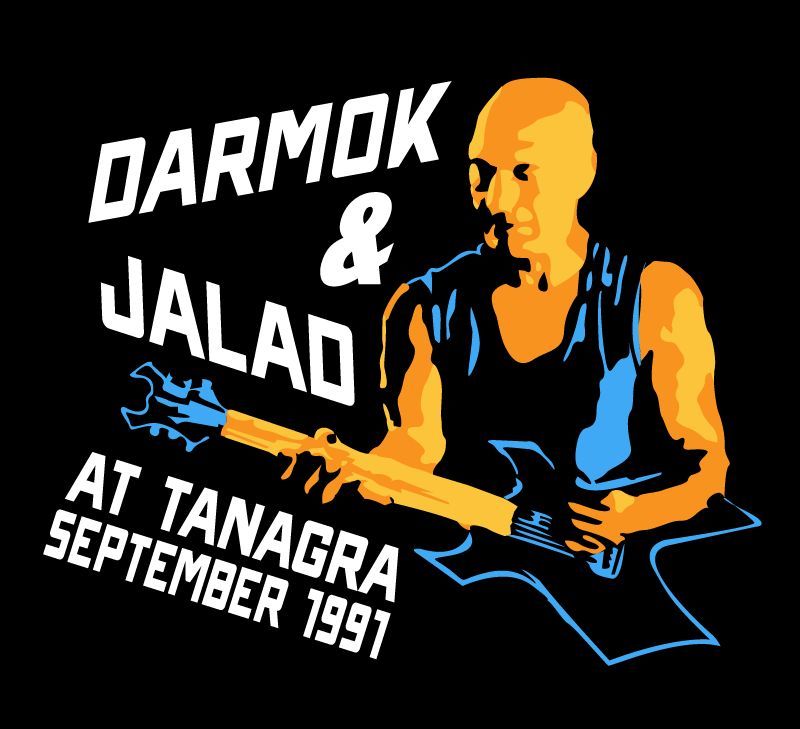
The tree of liberty must be refreshed from time to time
with the blood of patriots and tyrants,
but they tried to use ketchup.


